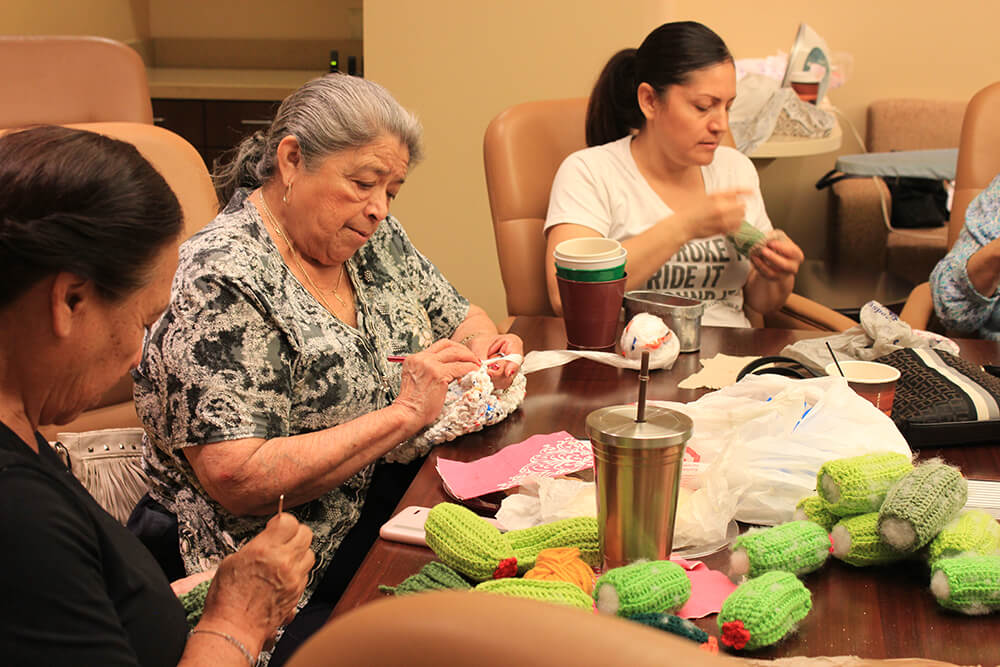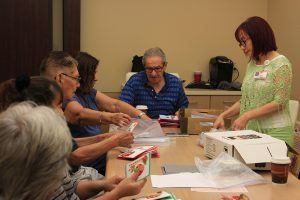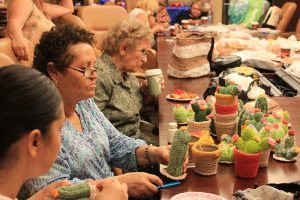
Barrow Offers Outreach Program for Hispanics With Parkinson’s
“I came from an environment where that’s how you show weakness, if you cry or tell them you’re hurt,” he said.
But when he began opening up to other people with Parkinson’s disease, he realized it helped him grow.
Otero was diagnosed with the movement disorder two years ago at age 55. He felt like someone had thrown a cold bucket of water in his face.
“It was one of the lowest parts of my life,” he said. “I didn’t know what to think, do, or say.”
Then he found the Hispanic Outreach Program at the Muhammad Ali Parkinson Center at Barrow Neurological Institute. He first attended a painting workshop.
“I had never painted before, so it was an awesome feeling to make something out of nothing, to convert the canvas into something alive and colorful,” he said. “That kept me going.”
Since then, Otero has also participated in the choir, support group, craft workshops, yoga classes, and a Parkinson’s education course.
Hispanic Outreach: More Than Translating
The Hispanic Outreach Program at the Muhammad Ali Parkinson Center is the most robust program of its kind in the United States, according to program coordinator Claudia Martinez.
She came to the U.S. from Colombia, where she worked as a family practice doctor. When she moved to Arizona, she decided to pursue her passions of health education and working with older adults.
To earn her graduate certificate in gerontology from Arizona State University, Martinez needed to log hours of experience in the field. ASU provided a list of organizations, and one of them was the Muhammad Ali Parkinson Center.
Martinez’s father had Parkinson’s disease, and the Colombian healthcare system offered few resources for him outside of neurological care and medication.
“I was curious to know what they did here—what else was available,” she said. “When I came to interview with the outreach team, I was so amazed by all the programs they had that target quality of life, socialization, and exercise and recreation.”

The next step for the outreach team was to tailor the center’s quality-of-life services specifically to the Hispanic community.
“The fact is that Parkinson’s affects all ethnicities and races, and Hispanics are the larger minority group in the U.S.,” Martinez said. “Having material that’s been translated to Spanish is not enough. The vision we had was to provide services that were culturally sensitive.”
Martinez’s personal and professional background made her a perfect fit to help create the program. Thanks to a three-year grant from the Parkinson’s Foundation, she and the team were able to launch it in 2007. The organization still provides funding for her position.
The team’s first objective was to create a support group that the Hispanic Parkinson’s community would embrace.
“For many Hispanics, talking about health issues is a very private subject,” she explained. “Most of the time, you don’t bring it up with people outside of your family. So, we called our first support group Platiquemos, which means ‘let’s chat.’ It was an opportunity to talk about Parkinson’s in a very informal way.”
The support group, now called Comadres y Compadres—meaning “good friends”—meets monthly in Tempe and Phoenix. It is also open to caregivers.
Learning to Live With Parkinson’s Disease
Another core element of the program is free education for both patients and caregivers.
Every year, the program hosts the Muhammad Ali Conference in Spanish: a full day of information and activities for the Spanish-speaking Parkinson’s community. To encourage global participation, the outreach team streams the conference online.
But the program also offers classes throughout the year, including the Parkinson’s Breakfast series. The series is split into two parts—each consisting of six seminars.
Part 1 covers topics such as how the brain works, why symptoms appear, the different treatments available and how they work, the importance of exercise and nutrition, and how to make the most out of doctors’ visits. Part 2 delves into fatigue, depression, anxiety, and changes in cognitive function.
Based on psychology, the PD SELF course teaches people with Parkinson’s to harness their inner strength to foster a positive and proactive attitude in the management of their disease.
“It helped me realize how to work with my disease instead of fighting against it,” Otero said.
Having material that’s been translated to Spanish is not enough. The vision we had was to provide services that were culturally sensitive.
-Claudia Martinez, Hispanic Outreach Coordinator
PD SELF was Adrian Ortega’s first experience with the Hispanic Outreach Program. He’d met Martinez a couple years prior but admits he was in denial about having Parkinson’s.
Ortega, now 49 years old, said he was about 43 or 44 when a neurologist diagnosed him with Parkinson’s disease with dystonia. According to the Parkinson’s Foundation, symptoms usually appear at age 50 or older. Young-onset Parkinson’s disease affects only about 2 to 10 percent of the approximately 1 million Americans with Parkinson’s.
Ortega finally attended the classes after some encouragement from Martinez. He recently returned to a PD SELF class to share his experience with new participants.
“The good thing is Claudia never gave up on me,” he said. “Her reaching out to me was the No. 1 thing that helped me—and getting out there with other people who have Parkinson’s to know I’m not alone.”
Otero also expressed his gratitude for Martinez’s support, calling her “small in stature but big in heart.”
Families in the Phoenix metro area who are unable to attend educational courses due to lack of transportation or other barriers can receive in-home education through the Promotores Program. The program assigns a trained volunteer to each family for 13 weekly visits.
The Importance of Exercise and Recreation
Many neurologists recommend regular, tailored exercise as part of the treatment plan for people with Parkinson’s disease. Research has shown that it can combat symptoms like stiffness and slowness. It may also improve cognitive function and overall quality of life in people with Parkinson’s.

Otero attends the Saturday-morning yoga classes with his wife. He credits yoga with helping him to remain calm and present in his everyday life. Otero said he forgets about his symptoms while he’s practicing yoga and while he’s painting.
The painting workshops allow people with Parkinson’s disease to practice their fine motor skills, and participants often leave feeling relaxed and accomplished. Their paintings are displayed at an annual art exhibition and throughout the Muhammad Ali Parkinson Center.
That sense of accomplishment is also prevalent among participants of Voces Unidas. The choir performs at local events and raises awareness about Parkinson’s disease.
“Many times, people are amazed at the fact that the patients can sing so well and they have Parkinson’s,” Martinez said. “It’s a very good teaching experience for the community, and the patients love to do it. It gives them a lot of pride.”
Patients also have the opportunity to give back to the Hispanic Outreach Program. They often donate the works of art they create in the painting and craft workshops for fundraising purposes.
What’s Next?
Because the Hispanic Outreach Program at the Muhammad Ali Parkinson Center has been so successful, Martinez is working with the Parkinson’s Foundation to replicate it in other areas, like California and Texas. She envisions a training conference where community leaders would learn how to develop and sustain similar services in their cities.
For many people with Parkinson’s disease, these services can be life-changing. Although Otero and Ortega still have tough days, they have found strength in numbers.
“Don’t be afraid to reach out,” Otero said. “The Parkinson’s is not going to go away, but you’re going to feel more secure, more confident to keep on taking that next step.”
